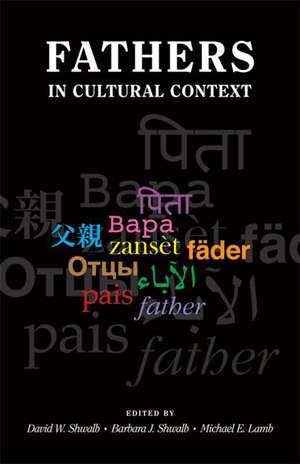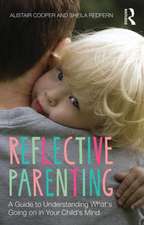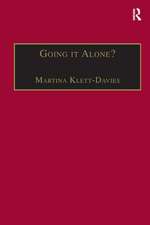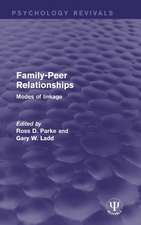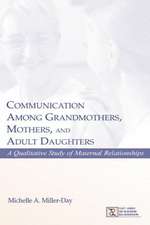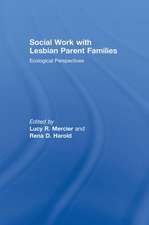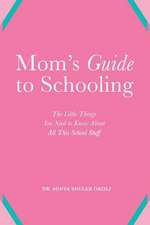Fathers in Cultural Context
Editat de David W. Shwalb, Barbara J. Shwalb, Michael E. Lamben Limba Engleză Paperback – 5 sep 2012
| Toate formatele și edițiile | Preț | Express |
|---|---|---|
| Paperback (1) | 373.21 lei 6-8 săpt. | |
| Taylor & Francis – 5 sep 2012 | 373.21 lei 6-8 săpt. | |
| Hardback (1) | 773.85 lei 6-8 săpt. | |
| Taylor & Francis – 5 sep 2012 | 773.85 lei 6-8 săpt. |
Preț: 373.21 lei
Preț vechi: 478.88 lei
-22% Nou
Puncte Express: 560
Preț estimativ în valută:
71.41€ • 74.56$ • 59.10£
71.41€ • 74.56$ • 59.10£
Carte tipărită la comandă
Livrare economică 05-19 aprilie
Preluare comenzi: 021 569.72.76
Specificații
ISBN-13: 9781848729483
ISBN-10: 1848729480
Pagini: 448
Ilustrații: 39 black & white illustrations, 4 black & white tables, 33 black & white halftones, 6 black & white line drawings
Dimensiuni: 152 x 229 x 23 mm
Greutate: 0.61 kg
Ediția:New.
Editura: Taylor & Francis
Colecția Routledge
Locul publicării:Oxford, United Kingdom
ISBN-10: 1848729480
Pagini: 448
Ilustrații: 39 black & white illustrations, 4 black & white tables, 33 black & white halftones, 6 black & white line drawings
Dimensiuni: 152 x 229 x 23 mm
Greutate: 0.61 kg
Ediția:New.
Editura: Taylor & Francis
Colecția Routledge
Locul publicării:Oxford, United Kingdom
Notă biografică
David W. Shwalb is a Professor of Psychology at Southern Utah University. He received his PhD in Developmental Psychology from the University of Michigan. A Fulbright Dissertation Fellow at Tokyo University, he is a former president of the Society for Cross-Cultural Research. Along with Barbara Shwalb, he is English Abstracts Editor for the Japanese Journal of Developmental Psychology. David and Barbara Shwalb have also co-authored or edited three books: Japanese Childrearing: Two Generations of Scholarship (1996), Applied Developmental Psychology: Theory, Practice and Research from Japan (2005), and Respect and Disrespect: Cultural and Developmental Origins (2005). During 8 years in Japan, Shwalb taught at the preschool, middle school, high school and college levels. He has conducted cross-cultural research on fathers since 1978, and his cross-cultural interests are in parenting, socialization, and personality development in family and school contexts, and in the developmental origins of respect, disrespect, and self-respect.
Barbara J. Shwalb is retired from the Psychology Department at Southern Utah University. She received her PhD (Combined Program in Education and Psychology) from the University of Michigan. She was a Japan Ministry of Education Fellow at Tokyo University.Along with David Shwalb, she was a research associate of the Japanese Child and Family National Research Center and the Hokkaido University Faculty of Education. Together, Barbara and David Shwalb have written six volumes, in both English and Japanese. Dr. Shwalb’s research interests are cross-cultural developmental and learning issues, and affective and cognitive concept formation in the development of respect and disrespect. The Shwalbs have published papers on human development in Japan, Korea, China, Vietnam, Indonesia, South Asia, and the U.S.
Michael E. Lamb heads the Division of Social and Developmental Psychology at the University of Cambridge. A native of Northern Rhodesia (now Zambia), he received his PhD in psychology from Yale University along with honorary doctorates from the Universities of Goteborg and East Anglia, and the 2004 James McKeen Cattell Award from the Association for Psychological Science for Lifetime Contributions to Applied Psychological Research. He is the co-author of Development in Infancy, Socialization and Personality Development, Infant-Mother Attachment, Child Psychology Today, Investigative Interviews of Children, and Tell Me What Happened: Structured Investigative Interviews of Child Victims and Witnesses. In addition, he has edited many books including The Role of the Father in Child Development and he founded and co-edited Advances in Developmental Psychology. In total he has authored or edited about 45 books an approximately 600 professional publications. Editor of the journal Psychology, Public Policy, and Law, Dr. Lamb has written or co-authored reports of research in the U.S., U.K., Sweden, Germany, Switzerland, Israel, Canada, the Central African Republic, the Congo, Malaysia, Taiwan, China (People’s Republic), Japan, Korea, and Costa Rica.
Barbara J. Shwalb is retired from the Psychology Department at Southern Utah University. She received her PhD (Combined Program in Education and Psychology) from the University of Michigan. She was a Japan Ministry of Education Fellow at Tokyo University.Along with David Shwalb, she was a research associate of the Japanese Child and Family National Research Center and the Hokkaido University Faculty of Education. Together, Barbara and David Shwalb have written six volumes, in both English and Japanese. Dr. Shwalb’s research interests are cross-cultural developmental and learning issues, and affective and cognitive concept formation in the development of respect and disrespect. The Shwalbs have published papers on human development in Japan, Korea, China, Vietnam, Indonesia, South Asia, and the U.S.
Michael E. Lamb heads the Division of Social and Developmental Psychology at the University of Cambridge. A native of Northern Rhodesia (now Zambia), he received his PhD in psychology from Yale University along with honorary doctorates from the Universities of Goteborg and East Anglia, and the 2004 James McKeen Cattell Award from the Association for Psychological Science for Lifetime Contributions to Applied Psychological Research. He is the co-author of Development in Infancy, Socialization and Personality Development, Infant-Mother Attachment, Child Psychology Today, Investigative Interviews of Children, and Tell Me What Happened: Structured Investigative Interviews of Child Victims and Witnesses. In addition, he has edited many books including The Role of the Father in Child Development and he founded and co-edited Advances in Developmental Psychology. In total he has authored or edited about 45 books an approximately 600 professional publications. Editor of the journal Psychology, Public Policy, and Law, Dr. Lamb has written or co-authored reports of research in the U.S., U.K., Sweden, Germany, Switzerland, Israel, Canada, the Central African Republic, the Congo, Malaysia, Taiwan, China (People’s Republic), Japan, Korea, and Costa Rica.
Recenzii
"The collection as a whole is strong, and the contributions on Africa and Asia are particularly interesting. For researchers studying fatherhood (and/or motherhood), the volume is indispensable. Summing Up: Essential. Upper-division undergraduates through faculty and professionals." - Ralph LaRossa, Georgia State University, for CHOICE, March 2013
"In our view, this book is an important milestone in the research on fathering. There have been few systematic attempts to bring together research about fathers from cross-cultural perspectives. The chapter authors were chosen well, and the chapters are, for the most part, well-written and filled with salient and interesting information. One could easily visualize this volume being used as a text for an upper-division or graduate class. In addition, it is a substantial starting point for those wishing to launch into cross-cultural research about fathers." - Randal D. Day & Nathan A. Jorgensen, Brigham Young University, in Fathering: A Journal of Theory, Research, and Practice
"This book was the required text for my Fathering class in the Family Studies Program, when I taught the course in Spring 2013 with 25 upper-division undergraduate students. It is an excellent book as it covers the context of fathering across cultural communities. All chapters are well-written and information is based on either empirical data and/or solid conceptual frameworks. Case stories are effective sections as they set the tone of each chapter and lead to good class discussions. This book is easy to read as each chapter is organized within a systematic theme of presentation, which makes it practical for my class as a text. My students received the book well; it is full of testable material and is a refreshing change from typical textbooks. I plan to use it when I teach my fathering class again." - Ziarat Hossain, Family Studies Program, University of New Mexico
"This outstanding book vividly describes the variety and common circumstances affecting men, fathers and families everywhere. Every chapter is captivating to read, moving from vivid case exemplars, to qualitative summaries of fathering patterns, historical trends, demographic influences, quantitative surveys, family studies, and current and future trends. Charting an exciting future course for father research, this is the book to lead the way." - Thomas S. Weisner, UCLA, USA
"Let me commend the editors of the present volume for succeeding in their Himalayan task of providing a panoramic view of fathers’ roles in different regions of the world. As an interested reader, I must state that this is one of the few books of readings in the field that enthuses the reader to go through the entire volume instead of choosing only a few chapters of specific interest. In fact, the reader’s interest is sustained by wanting to "discover" what happens to fathers in other cultures, and to make cross-cultural comparisons in one’s own. Kudos for a well timed and useful contribution to the field." – T.S. Saraswathi, Baroda University, in International Society for the Study of Behavioral Development Newsletter
"Fathers in Cultural Context provides a worthy follow up to Lamb’s 1987 book, The Father’s Role: Cross Cultural Perspectives.I found the Foreward and the Introduction to be extremely informative, and recommend that readers treat those sections with the same attention and focus as one would bring to reading the volume’s core content.I highly recommend Fathers in Cultural Context. It is an invaluable tool for researchers, teachers, and students of anthropology, psychology, human development, and cultural studies to name a few. Social work, human services, and educational scholars and professionals will also benefit from discussions of the social policy implications of fatherhood research covered in each chapter." -Robert A. Veneziano, Department of Social Work, Western Conneticut State University, in Interpersonal Acceptance
"Fathers in Cultural Context is an important addition to our understanding of fatherhood in a rapidly globalizing world. It is rare that a volume like this can balance such a large number of perspectives without overwhelming the read-er, and it accomplishes this balance in a way that suits the needs of practitioners, scholars, policy makers, and students interested in fatherhood across cultures." - Ryan A. McKelley, Ph.D., LP University of Wisconsin-La Crosse in International Psychology Bulletin
"Fathers in Cultural Context, edited by David W. Shwalb, Barbara J. Shwalb, and Michael E. Lamb, provides a comprehensive and thoughtful compilation of the latest research on fathering across various cultural and situational contexts. Across a collection of 16 chapters, the book contributors provide in-depth discussions of the diverse influences on fathering (cultural and historical, cultural, economic, and social) from 14 nations around the globe. Fathers in Cultural Context is a timely text that provides insight into an important subject which is on the brink of greater understanding and discovery." -Emily Savage-McGlynn, Oxford University, in Infant & Child Development
"An excellent reference for students and scholars seeking both up-to-date research information and suggestions about why the place of fathers is undergoing rapid change. ... Much is to be learned about changing gender roles and family relationships across the world." - Don Edgar, Victorian Children's Council, Australia, in the Journal of Family Studies
"If there ever were a crib sheet about contemporary fatherhood, this book is it." - Gwen Dewar, biological anthropologist and creator of Parenting Science, USA, in BabyCenter.com
"This book makes a vitally important contribution in making contemporary fatherhood studies truly global and truly inclusive. It presents cutting edge current research in a wide range of diverse societies, and brings the cross-cultural perspective in fathering research to a new level." - From the Foreword, Joseph H. Pleck, University of Illinois at Urbana-Champaign, USA
"A top-rated team of internationally recognized scholars have produced eloquently written and comprehensively researched chapters. This truly unique book also uses men's individual stories to expose readers to larger issues of culture and family. It brings the best science to bear on what we know about fathering across the world, and is a must read for anyone seriously interested in fathering." - Natasha J. Cabrera, University of Maryland, College Park, USA
"This remarkable new book provides a gold mine of observations on fatherhood and fathering around the world. The editors have assembled an impressive array of leading fathering scholars, providing cutting-edge and original contributions about how fathers contribute to family, neighbourhood and community life worldwide." - Margaret O'Brien, University of East Anglia, UK
"This book demonstrates how far research on fatherhood has come since the 1970s. ... This volume’s ability to link general themes to the subcultural variation of a specific region gives the text its richness. Whether it is the impact of migrant labour structures on contemporary Arab fatherhood or the European phenomenon of ‘multiple fatherhood’, the contributors are adept drawing out the social and economic context of these transitions. ... The way the text challenges any naturalised notion of fatherhood would be of value to any family practitioner. Most striking was the editors’ concern about the way that the North American preoccupation with fathering as ‘essential’ to child development skews research priorities in other regions." - Warren Matofsky, Clinical Child & Family Psychologist, Sussex, UK, in The Psychologist
This unique book makes a significant contribution to our understanding of the role that fathers play throughout the world. ... [It] provides readers with research originally published in languages other than English, thereby making previously inaccessible research available to a vast audience ... [and] personalizes the research by offering the photos and case studies of a typical or a distinctive father in each culture. … [The book] presents the research in a non-technical, “user friendly” way that will appeal to students.“– Linda Nielsen, Wake Forest University, USA
"The editors provided a book that is written in such a way to allow those outside the field of Psychology to read and understand the information provided without sacrificing intelligent writing. I have already recommended this book to many individuals, including professionals inside and outside of Psychology, and I intend to continue recommending this book for those wanting to see a broadly cultural perspective of fatherhood." -Ashley B. Hampton, Ph.D, American Psychological Association Division 51
"The specific strength of this volume is precisely this array of international research that it puts together, enabling the readers to understand how historical, social and cultural contexts and rapid changes in social conditions around the world have shaped and influenced notions of fatherhood...reviews of research from countries across the world give ample scope for designing and initiating further and collaborative research in this emerging and potentially exciting field."- U. Vindhya, Tata Institute of Social Sciences, Hyderabad, India, in Psychological Studies
"The book is rich in anecdotes, concepts, study methods, and provocative pieces....Chapters on the Arab world and Bangladesh and Malaysia are among those making some of the most novel splashes into the cross-cultural fathering literature...Its rich empirical and conceptual content pushes readers to grapple with the variable nature of fathering and its rapid change in many cultural contexts." - Peter B. Gray, Department of Anthropology, University of Nevada, Las Vegas, in International Journal of Intercultural Relations
"The book is meticulously researched and well written. Each chapter integrates empirical studies, history, sociopolitical and cultural themes, and the authors’ insights to paint an intricate picture of fathering in that country...Owing to its organization into relatively free-standing chapters, this book is conducive to being perused piece by piece by busy readers." - Shannon Wagner Simmons, College of Medicine, University of Illinois at Chicago Circle, in Journal of the American Academy of Child & Adolescent Psychiatry
"Fathers in Cultural Context represents an ambitious attempt to explore and combine into a comprehensive collection two relatively under researched areas within family studies: fatherhood and cross-cultural variations in parenting. Each contributor is able to approach the issue of fatherhood from differing levels of analysis—micro-individual to the macro-social—in a which partly addresses many of the methodological burdens that have plagued social scientific research." - Edward Haddon, University of British Columbia, in Journal of Comparative Family Studies
"The book's success lies in the description of the significant cultural variance in fathering practices within and between cultures. [...] [The] authors admirably avoid the temptation to conflate involved parenting with modernity or to vilify fathers who do not follow the apparently emerging trend away from the sole breadwinner towards greater non-financial fatherly involvement with children." -Alex Nelson & William Jankowiak, Department of Anthropology, University of Nevada, Las Vegas, in Ethos
"In our view, this book is an important milestone in the research on fathering. There have been few systematic attempts to bring together research about fathers from cross-cultural perspectives. The chapter authors were chosen well, and the chapters are, for the most part, well-written and filled with salient and interesting information. One could easily visualize this volume being used as a text for an upper-division or graduate class. In addition, it is a substantial starting point for those wishing to launch into cross-cultural research about fathers." - Randal D. Day & Nathan A. Jorgensen, Brigham Young University, in Fathering: A Journal of Theory, Research, and Practice
"This book was the required text for my Fathering class in the Family Studies Program, when I taught the course in Spring 2013 with 25 upper-division undergraduate students. It is an excellent book as it covers the context of fathering across cultural communities. All chapters are well-written and information is based on either empirical data and/or solid conceptual frameworks. Case stories are effective sections as they set the tone of each chapter and lead to good class discussions. This book is easy to read as each chapter is organized within a systematic theme of presentation, which makes it practical for my class as a text. My students received the book well; it is full of testable material and is a refreshing change from typical textbooks. I plan to use it when I teach my fathering class again." - Ziarat Hossain, Family Studies Program, University of New Mexico
"This outstanding book vividly describes the variety and common circumstances affecting men, fathers and families everywhere. Every chapter is captivating to read, moving from vivid case exemplars, to qualitative summaries of fathering patterns, historical trends, demographic influences, quantitative surveys, family studies, and current and future trends. Charting an exciting future course for father research, this is the book to lead the way." - Thomas S. Weisner, UCLA, USA
"Let me commend the editors of the present volume for succeeding in their Himalayan task of providing a panoramic view of fathers’ roles in different regions of the world. As an interested reader, I must state that this is one of the few books of readings in the field that enthuses the reader to go through the entire volume instead of choosing only a few chapters of specific interest. In fact, the reader’s interest is sustained by wanting to "discover" what happens to fathers in other cultures, and to make cross-cultural comparisons in one’s own. Kudos for a well timed and useful contribution to the field." – T.S. Saraswathi, Baroda University, in International Society for the Study of Behavioral Development Newsletter
"Fathers in Cultural Context provides a worthy follow up to Lamb’s 1987 book, The Father’s Role: Cross Cultural Perspectives.I found the Foreward and the Introduction to be extremely informative, and recommend that readers treat those sections with the same attention and focus as one would bring to reading the volume’s core content.I highly recommend Fathers in Cultural Context. It is an invaluable tool for researchers, teachers, and students of anthropology, psychology, human development, and cultural studies to name a few. Social work, human services, and educational scholars and professionals will also benefit from discussions of the social policy implications of fatherhood research covered in each chapter." -Robert A. Veneziano, Department of Social Work, Western Conneticut State University, in Interpersonal Acceptance
"Fathers in Cultural Context is an important addition to our understanding of fatherhood in a rapidly globalizing world. It is rare that a volume like this can balance such a large number of perspectives without overwhelming the read-er, and it accomplishes this balance in a way that suits the needs of practitioners, scholars, policy makers, and students interested in fatherhood across cultures." - Ryan A. McKelley, Ph.D., LP University of Wisconsin-La Crosse in International Psychology Bulletin
"Fathers in Cultural Context, edited by David W. Shwalb, Barbara J. Shwalb, and Michael E. Lamb, provides a comprehensive and thoughtful compilation of the latest research on fathering across various cultural and situational contexts. Across a collection of 16 chapters, the book contributors provide in-depth discussions of the diverse influences on fathering (cultural and historical, cultural, economic, and social) from 14 nations around the globe. Fathers in Cultural Context is a timely text that provides insight into an important subject which is on the brink of greater understanding and discovery." -Emily Savage-McGlynn, Oxford University, in Infant & Child Development
"An excellent reference for students and scholars seeking both up-to-date research information and suggestions about why the place of fathers is undergoing rapid change. ... Much is to be learned about changing gender roles and family relationships across the world." - Don Edgar, Victorian Children's Council, Australia, in the Journal of Family Studies
"If there ever were a crib sheet about contemporary fatherhood, this book is it." - Gwen Dewar, biological anthropologist and creator of Parenting Science, USA, in BabyCenter.com
"This book makes a vitally important contribution in making contemporary fatherhood studies truly global and truly inclusive. It presents cutting edge current research in a wide range of diverse societies, and brings the cross-cultural perspective in fathering research to a new level." - From the Foreword, Joseph H. Pleck, University of Illinois at Urbana-Champaign, USA
"A top-rated team of internationally recognized scholars have produced eloquently written and comprehensively researched chapters. This truly unique book also uses men's individual stories to expose readers to larger issues of culture and family. It brings the best science to bear on what we know about fathering across the world, and is a must read for anyone seriously interested in fathering." - Natasha J. Cabrera, University of Maryland, College Park, USA
"This remarkable new book provides a gold mine of observations on fatherhood and fathering around the world. The editors have assembled an impressive array of leading fathering scholars, providing cutting-edge and original contributions about how fathers contribute to family, neighbourhood and community life worldwide." - Margaret O'Brien, University of East Anglia, UK
"This book demonstrates how far research on fatherhood has come since the 1970s. ... This volume’s ability to link general themes to the subcultural variation of a specific region gives the text its richness. Whether it is the impact of migrant labour structures on contemporary Arab fatherhood or the European phenomenon of ‘multiple fatherhood’, the contributors are adept drawing out the social and economic context of these transitions. ... The way the text challenges any naturalised notion of fatherhood would be of value to any family practitioner. Most striking was the editors’ concern about the way that the North American preoccupation with fathering as ‘essential’ to child development skews research priorities in other regions." - Warren Matofsky, Clinical Child & Family Psychologist, Sussex, UK, in The Psychologist
This unique book makes a significant contribution to our understanding of the role that fathers play throughout the world. ... [It] provides readers with research originally published in languages other than English, thereby making previously inaccessible research available to a vast audience ... [and] personalizes the research by offering the photos and case studies of a typical or a distinctive father in each culture. … [The book] presents the research in a non-technical, “user friendly” way that will appeal to students.“– Linda Nielsen, Wake Forest University, USA
"The editors provided a book that is written in such a way to allow those outside the field of Psychology to read and understand the information provided without sacrificing intelligent writing. I have already recommended this book to many individuals, including professionals inside and outside of Psychology, and I intend to continue recommending this book for those wanting to see a broadly cultural perspective of fatherhood." -Ashley B. Hampton, Ph.D, American Psychological Association Division 51
"The specific strength of this volume is precisely this array of international research that it puts together, enabling the readers to understand how historical, social and cultural contexts and rapid changes in social conditions around the world have shaped and influenced notions of fatherhood...reviews of research from countries across the world give ample scope for designing and initiating further and collaborative research in this emerging and potentially exciting field."- U. Vindhya, Tata Institute of Social Sciences, Hyderabad, India, in Psychological Studies
"The book is rich in anecdotes, concepts, study methods, and provocative pieces....Chapters on the Arab world and Bangladesh and Malaysia are among those making some of the most novel splashes into the cross-cultural fathering literature...Its rich empirical and conceptual content pushes readers to grapple with the variable nature of fathering and its rapid change in many cultural contexts." - Peter B. Gray, Department of Anthropology, University of Nevada, Las Vegas, in International Journal of Intercultural Relations
"The book is meticulously researched and well written. Each chapter integrates empirical studies, history, sociopolitical and cultural themes, and the authors’ insights to paint an intricate picture of fathering in that country...Owing to its organization into relatively free-standing chapters, this book is conducive to being perused piece by piece by busy readers." - Shannon Wagner Simmons, College of Medicine, University of Illinois at Chicago Circle, in Journal of the American Academy of Child & Adolescent Psychiatry
"Fathers in Cultural Context represents an ambitious attempt to explore and combine into a comprehensive collection two relatively under researched areas within family studies: fatherhood and cross-cultural variations in parenting. Each contributor is able to approach the issue of fatherhood from differing levels of analysis—micro-individual to the macro-social—in a which partly addresses many of the methodological burdens that have plagued social scientific research." - Edward Haddon, University of British Columbia, in Journal of Comparative Family Studies
"The book's success lies in the description of the significant cultural variance in fathering practices within and between cultures. [...] [The] authors admirably avoid the temptation to conflate involved parenting with modernity or to vilify fathers who do not follow the apparently emerging trend away from the sole breadwinner towards greater non-financial fatherly involvement with children." -Alex Nelson & William Jankowiak, Department of Anthropology, University of Nevada, Las Vegas, in Ethos
Cuprins
Dedication. J. Pleck, Foreword. D. W. Shwalb, B. J. Shwalb, M. E. Lamb, Preface. Part One Introduction D. W. Shwalb, B. J. Shwalb, M. E. Lamb,Introduction. Part Two Asia X,Li, M. E. Lamb, Fathers in Chinese Culture: From Stern Disciplinarians to Involved Parents. J. Nakazawa, D. W. Shwalb, Fathering in Japan: Entering an Era of Involvement with Children. N. Chaudhary, The Father’s Role in the Indian Family: A Story That Must be Told. Z. Hossain, Fathers in Muslim Families in Bangladesh and Malaysia. R. A. Ahmed, The Father’s Role in the Arab World: Cultural Perspectives. Part Three Africa H. N. Fouts, Fathering in Central and East Africa: Cultural and Adaptationist Perspectives in Small-Scale Societies. N. W. Townsend, Complications of Fathering in Southern Africa: Separation, Uncertainty, and Multiple Responsibilities. Part Four Americas J. L. Roopnarine, Fathers in Caribbean Cultural Communities. A. C. Bastos, V. Volkmer-Pontes, H. Martinelli Serra, P. Brasileiro, Fathering in Brazil: A Diverse and Unknown Reality. K. E. McFadden, C. S. Tamis-LeMonda, Fathers in the U.S. Part Five Europe J. Utrata, J. M. Ispa, S. Ispa-Landa, Men on the Margins of Family Life: Fathers in Russia. L. L. Haas, C. P. Hwang, Fatherhood and Social Policy in Scandinavia. C. Lewis, Fatherhood and Fathering Research in the UK: Cultural Change and Diversity. Part Six Australia B. M. Smyth, J. A. Baxter, R. J. Fletcher, L. J. Moloney, Fathers in Australia: A Contemporary Snapshot. Part Seven Conclusions D. W. Shwalb, B. J. Shwalb,M. E. Lamb, Final Thoughts, Comparisons, and Conclusions.
